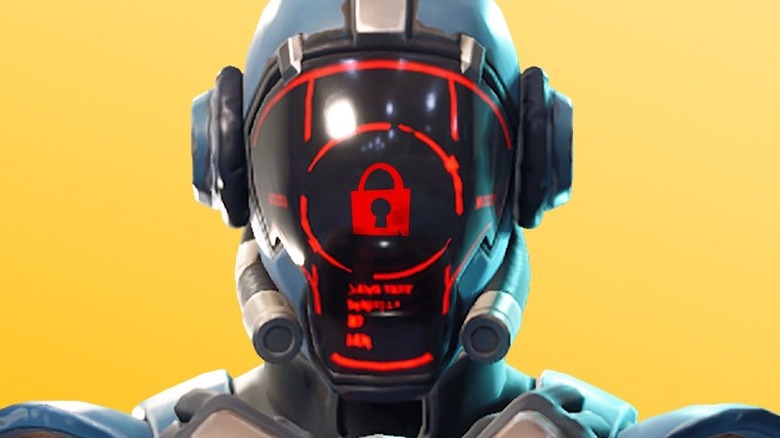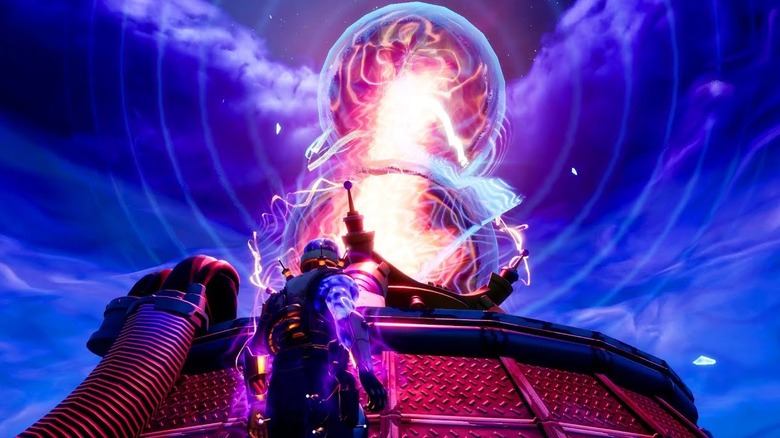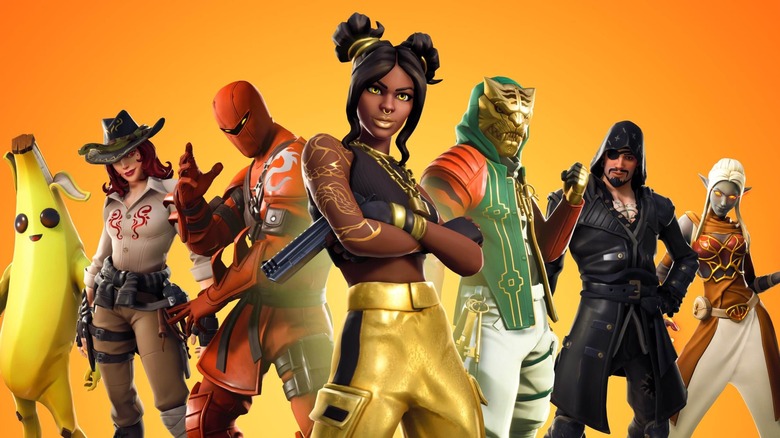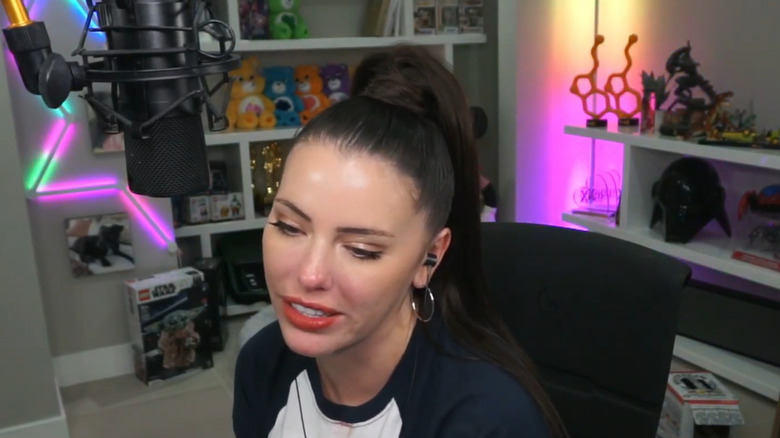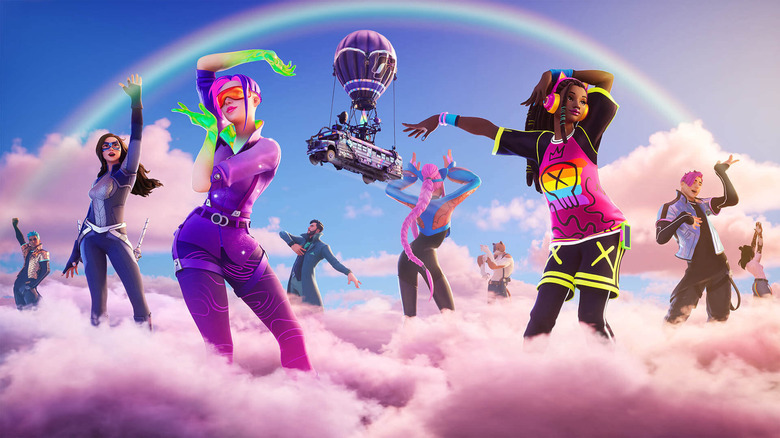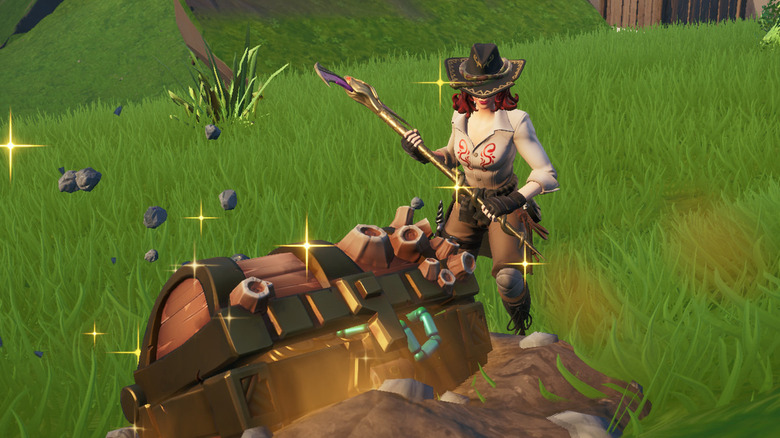The Shady Side Of Fortnite
On the surface, "Fortnite" looks like the poster child for success in the video game industry. After "Fortnite: Save the World" received a lukewarm response from players and critics, developer Epic Games achieved the ultimate comeback with the addition of a battle royale mode. This move catapulted the title into the spotlight and led to massive growth at the studio. But there's more to "Fortnite" than just crossover events and piñatas.
"Fortnite" has had a growing shady side since its inception. Its battle royale component, the main source of its notable prosperity, rips multiple elements straight from "PUBG," the title that popularized the genre in the first place. "PUBG" was created using Unreal Engine, which Epic Games happens to own – a fact that makes the many similarities between the two games more dubious. "Fortnite" has only continued to spawn controversies since its initial surge in popularity, leading to a deluge of tears, accusations, and legal action.
Fortnite broke a Twitch record by limiting player access to a season finale
"Fortnite" and Twitch viewership milestones have long gone hand-in-hand. For example, in 2018, Ninja set one of his most impressive records by joining forces with Drake, Travis Scott, and Juju Smith-Schuster for a "Fortnite" session. The stream drew in 650,000 concurrent viewers – the highest amount a single non-tournament stream had enjoyed at the time.
In 2020, "Fortnite" saw even more success on the streaming platform when its season finale event, The Device, attracted 2.3 million live viewers at once across all channels. This broke the Twitch record for all-time concurrent viewers, beating out the 2019 "League of Legends" World Championship. While this seemed like a win for Epic Games at first glance, the way it secured the landmark left many gamers questioning the developer's motives.
The morning that The Device was scheduled to go live, Epic tweeted that the event would have a restricted number of slots and encouraged "Fortnite" players to queue half an hour early. Sure enough, about 30 minutes before The Device kicked off, the game had already hit its 12 million player cap. Epic then directed those who didn't make the cut to watch the event unfold on Twitch, YouTube, or Mixer. Epic later stated that it had limited the number of players to maintain game "stability." This didn't stop multiple individuals from suggesting that the company had restricted participation purely to force more people to watch The Device and secure additional streaming records for "Fortnite."
Epic Games paid millions after allegations of unlawful Fortnite business practices
"Fortnite" may be one of the most popular games in the world, but it often comes under fire for interactions with one of its core audiences: children. In late 2022, the Federal Trade Commission (FTC) determined that Epic Games would have to pay "a $520 million settlement" due to two complaints filed against it. One alleged that its personal information collection practices and default communication settings had violated the Children's Online Privacy Protection Act (COPPA). The second claimed that the company had "used dark patterns to trick players into making unwanted purchases and let children rack up unauthorized charges without any parental involvement."
Epic Games agreed to the settlement, stating that it wanted to be "at the forefront of consumer protection and provide the best experience for our players." It also detailed a number of changes to "Fortnite" that it had rolled out, some of which were based on the issues raised by the FTC. Though it expressed this sentiment, it wrote that "the practices referenced in the FTC's complaints are not how 'Fortnite' operates." Its statement also did not address the FTC's assertion that "children and teens have been bullied, threatened, harassed, and exposed to dangerous and psychologically traumatizing issues such as suicide while on 'Fortnite.'"
The FTC announced plans to use $245 million of the amount paid by Epic to refund impacted "Fortnite" players. Meanwhile, whether or not "Fortnite" negatively affects kids remains heavily debated.
A judge called out Epic for wanting to make 'impulse purchases' easier for young Fortnite players
Questions regarding Epic's potentially predatory relationship with children who play "Fortnite" arose long before the FTC stepped in. One notable example unfolded in mid-2021 during the Epic v. Apple court proceedings. The trial took place in the United States District Court for the Northern District of California, prompted by a lawsuit filed by Epic against Apple related to its iOS Apple Store purchase policies.
While a number of interesting arguments came up as part of the lawsuit, one of the more questionable moments centered on access to V-Bucks. After Epic stated that it wanted to make the process for purchasing the in-game "Fortnite" currency more straightforward, Judge Yvonne Gonzalez Rogers suggested that the company didn't have the best interests of its customers, many of whom are minors, at heart.
"Why should we want them to have the ability to just on impulse buy something?" questioned Rogers (via The Verge). "What you're really asking for is the ability to have impulse purchases." Epic CEO Tim Sweeney acknowledged the inquiry, though he didn't address its darker implications, especially for children. Instead, he reasserted his company's dedication to "customer convenience."
Adriana Chechik barred last minute from Fortnite Twitch Rivals No Build Event
Epic Games drew scrutiny in August 2022 after streamer Adriana Chechik shared that she had been barred from taking part in the "Fortnite" Twitch Rivals No Build Event. Chechik claimed that she got the news only an hour before the tournament's scheduled kick-off and that her disqualification came as a result of her involvement with the adult entertainment world. "Epic Games didn't approve of my background," Chechik said on stream. The decision, and how it was handled, spawned a fair amount of debate on social media, with some calling it "dehumanizing" and an act of "discrimination."
After word of Chechik's situation went public, the official "Fortnite" Twitter account followed up with an apology and an explanation. "We're so sorry this happened," it wrote. "The request to @TwitchRivals was to work with you to remove adult references from your stream's background due to our game's rating. We have no issue with you participating in events or streaming Fortnite."
While some individuals felt Epic's words reflected well on the company, Chechik ultimately didn't get to take part in the Twitch Rivals No Build Event. The situation may have also contributed to Twitch's decision to ban Chechik the following day, though she was quickly able to resume streaming on the platform.
Epic Games sued multiple teenaged Fortnite players for copyright infringement
Epic Games has made it clear over the years that it doesn't mess around when it comes to cheating in "Fortnite." In 2019, the company permanently banned FaZe Jarvis after he came clean about using aimbots in the battle royale. The content creator was 17 at the time, though he is hardly the youngest "Fortnite" cheater that the publishing behemoth has gone after.
On at least two separate occasions, Epic Games has targeted minors with lawsuits (via PC Gamer). Both teenagers found themselves in court after the company alleged that they had showcased "Fortnite" hacks on YouTube. Epic asserted that this violated the title's end-user license agreement (EULA) and infringed on its copyright.
In one case, the defendant's mother blasted the company in a letter to the judge for its handling of the suit. She stated that Epic had illegally shared her son's name with the public and was "using a 14-year-old child as a scapegoat to make an example of him." Both lawsuits ultimately ended in settlements, but they raised questions about whether targeting minors with legal action for cheating in a video game is appropriate. However, according to Epic, at least one of them could have been avoided if the minor in question hadn't filed "a DMCA counterclaim" following the removal of his "Fortnite" hack video (per Kotaku).
Lawsuit accused Epic Games of making Fortnite as 'addictive as possible'
In 2019, a Canadian law firm initiated a class action lawsuit against Epic Games. The proposed case made waves at the time, in part because it compared playing "Fortnite" to cocaine use. Calex Légal, the firm that proposed the suit, claimed that the developers behind the battle royale had collaborated with multiple psychologists to maximize its addictive qualities. Drawing on a precedent set for the tobacco industry in 2015, it suggested that Epic was liable for damages because it did not warn buyers upfront of the possible dangers of queuing up – especially for those under the age of 18.
At the end of 2022, a Quebec judge finally gave the lawsuit the green light (via CTV). This did not indicate that the claims made in the legal notice have been proven. Instead, it meant the judge who reviewed the proposal felt it had potential merit. "The claim does not appear to be frivolous or manifestly ill-founded," the judge concluded. Epic Games fervently disagreed, but it seems that won't stop the case from moving forward.
The existence and nature of video game addiction continue to spawn disagreements. While the World Health Organization has recognized gaming disorder as an uncommon condition requiring treatment, the American Psychiatric Association has yet to reach a conclusion on video game addiction. However, the latter has also pointed out that a growing body of research may indicate that gaming addiction might be a genuine and widespread problem.
Employees claimed that Epic fostered a merciless crunch culture to support Fortnite
"Fortnite" has attracted millions of players and amassed billions of dollars in revenue since its debut in 2017. But building Epic's gaming empire exacted a toll on the employees and freelancers who toiled away behind the scenes. According to Polygon, hitting those numbers required 70- to 100-hour work weeks. Multiple contractors shared stories with the outlet that highlighted the intense pressure to work large amounts of overtime, an unsustainable reality that had both mental and physical consequences.
While crunch once reached a natural stopping point after a title's launch, the growing popularity of the games as a service model has resulted in a never-ending succession of deadlines. "Fortnite" embodies this approach, rolling out seemingly non-stop fixes and patches on top of its shifting seasonal content. Polygon's sources shared that both staff and freelancers would often face termination if they refused to engage in overtime. Management reportedly referred to contractors as "bodies" that they could easily ditch and replace once the company got all it could out of them.
Epic acknowledged that overtime occurred following the breakout success of the "Fortnite" Battle Royale mode, but it denied the extreme scenarios described to Polygon. It's unclear if the crunch situation has improved in the years since, though the company converted hundreds of its contract workers, many of whom worked for quality assurance (QA), into full-time employees with benefits packages back in 2022 (per The Verge).

